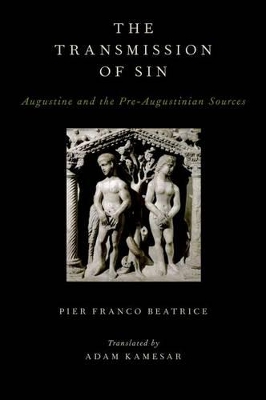AAR Religions in Translation
1 total work
Originally published in Italian in 1978, The Transmission of Sin is a study of the origins of the doctrine of original sin, one of the most important teachings of the Catholic Church. While the doctrine has a basis in biblical sources, it found its classic expression in the work of St. Augustine. Yet Augustine did not work out his theory on the basis of the biblical texts alone, rather he sought to understand them in the context of the religious thinking of
his own time. Pier Franco Beatrice's work seeks to illuminate that context, and discover the post-biblical influences on Augustine's thought. Although he made considerable efforts to defend and elaborate the doctrine of hereditary guilt, says Beatrice, the doctrine already existed before Augustine and was in
fact widespread in the Christianity of the time, particularly in the West. He locates its origins in Egypt in the second half of the second century CE, in Jewish-Christian circles that saw sexual congress as the source of the physical and moral corruption that afflicts all humans. In reaction to this extreme view, which rejected marriage and procreation as inherently evil, other theologians developed a more moderate position, recognizing only personal sin, which could not be inherited. Beatrice
argues that Augustine's doctrine exemplified a synthesis of these two trends which would ultimately triumph as the orthodox Catholic position.
his own time. Pier Franco Beatrice's work seeks to illuminate that context, and discover the post-biblical influences on Augustine's thought. Although he made considerable efforts to defend and elaborate the doctrine of hereditary guilt, says Beatrice, the doctrine already existed before Augustine and was in
fact widespread in the Christianity of the time, particularly in the West. He locates its origins in Egypt in the second half of the second century CE, in Jewish-Christian circles that saw sexual congress as the source of the physical and moral corruption that afflicts all humans. In reaction to this extreme view, which rejected marriage and procreation as inherently evil, other theologians developed a more moderate position, recognizing only personal sin, which could not be inherited. Beatrice
argues that Augustine's doctrine exemplified a synthesis of these two trends which would ultimately triumph as the orthodox Catholic position.
